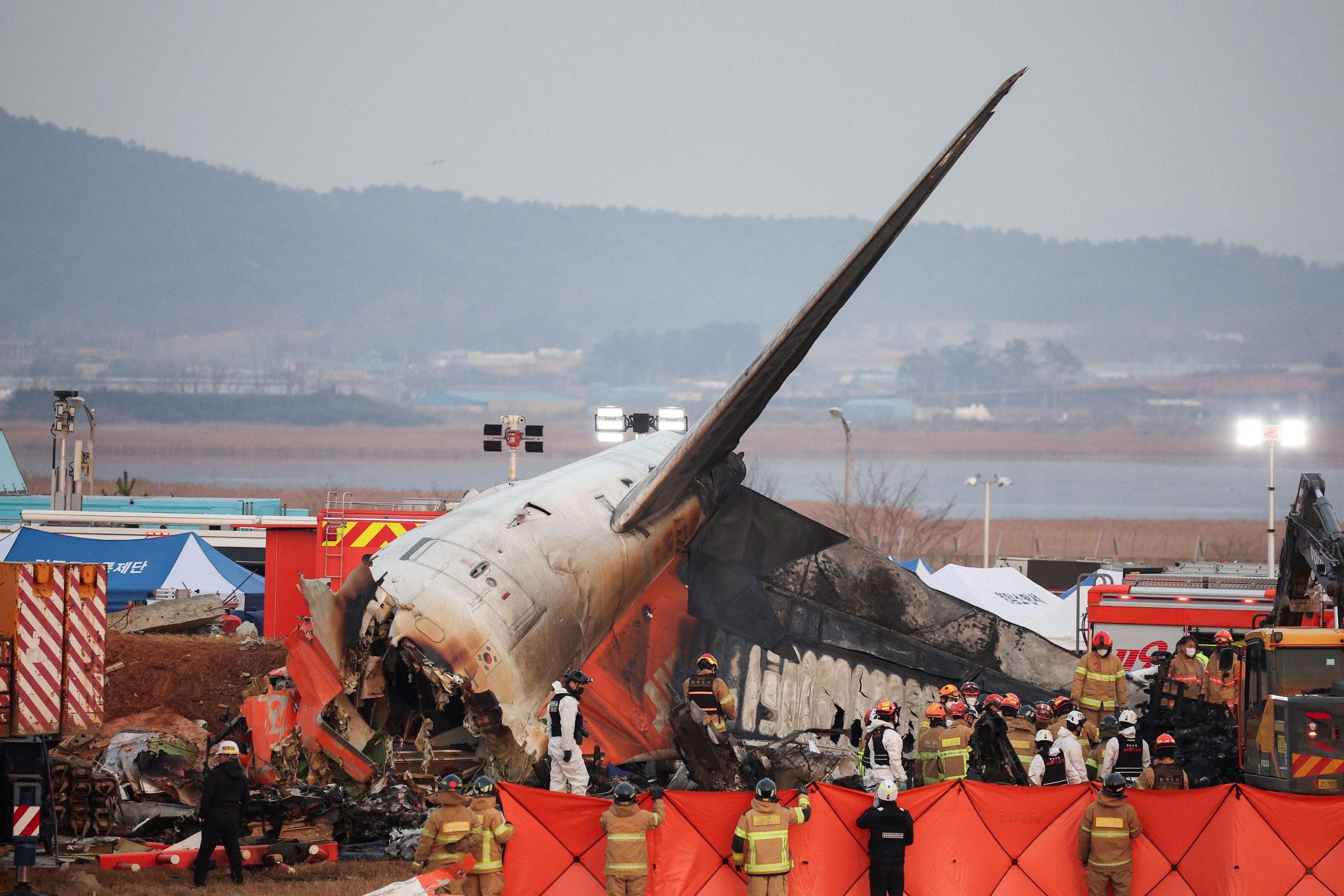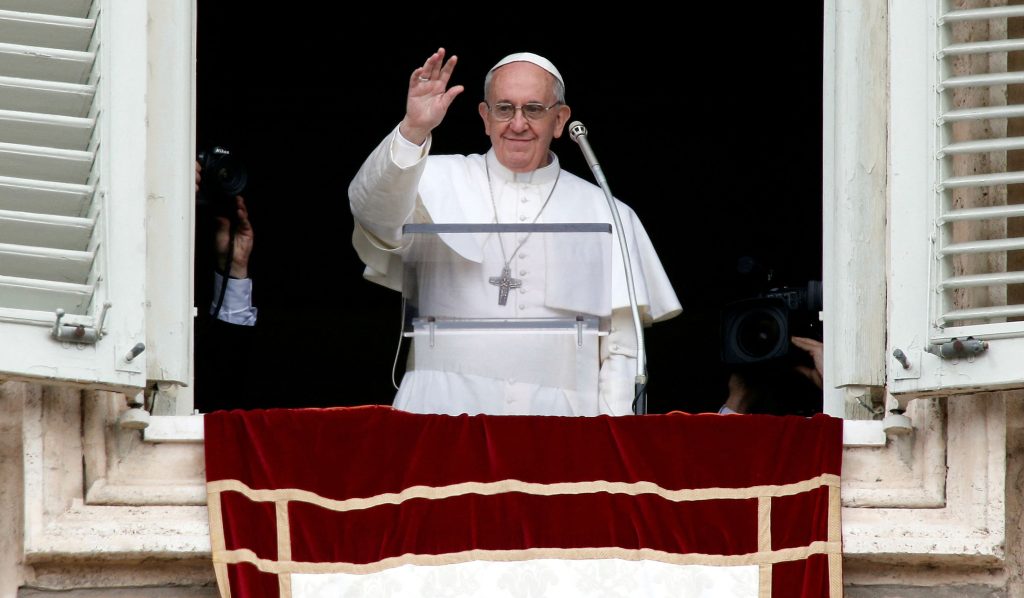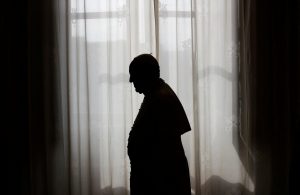SEOUL—At least 127 people died after a plane crashed Sunday while attempting to land at an airport in South Korea, according to the country’s national fire agency.
The plane skidded off the runway and collided with a barrier at an airport in Muan County, located in the country’s southwest, according to the fire agency. The crash occurred shortly after 9 a.m. local time. The flight, operated by South Korea’s Jeju Air , had departed from Bangkok with 175 passengers and six crew members aboard.
Rescue operations continued hours after the crash. Two people had been rescued. Choi Sang-mok , South Korea’s acting president, declared the region a special disaster zone, which allows those affected to receive support funds from the state. He arrived at the site of the crash about four hours after it had occurred. More than 1,500 emergency personnel have been dispatched.
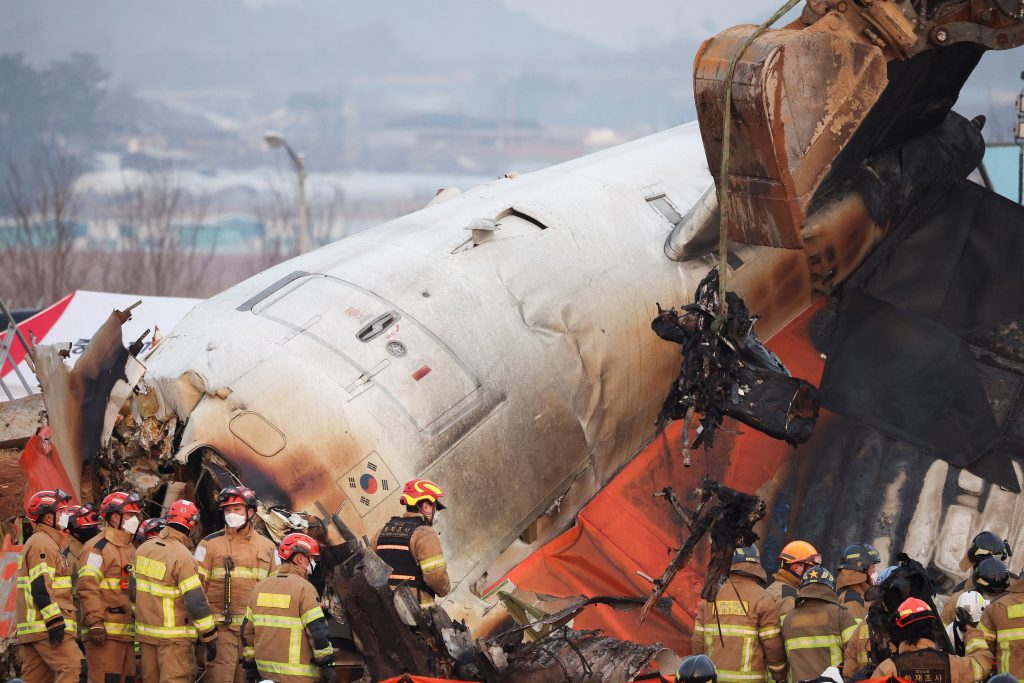
An excavator is used to lift burnt chairs from the wreckage of an aircraft that crashed after it went off the runway at Muan International Airport, in Muan, South Korea, December 29, 2024. REUTERS/Kim Hong-Ji
The aircraft involved in the crash was a Boeing 737-800, a narrow-body jet, according to Flightradar24. It has a strong safety record and is a workhorse of commercial air travel. The 737-800 is a predecessor to the 737 MAX, which was involved in two separate fatal crashes and was grounded worldwide in 2019 for nearly two years.
Two Thai nationals were on board, with the rest of the passengers South Korean citizens, according to South Korea’s Transportation Ministry.
In a roughly two-minute briefing with reporters, Kim E-bae, the CEO of Jeju Air, apologized to victims and their family members, promising the company would do its best to support them. He added the plane had no history of accidents and that no abnormalities were detected during maintenance inspections before takeoff.
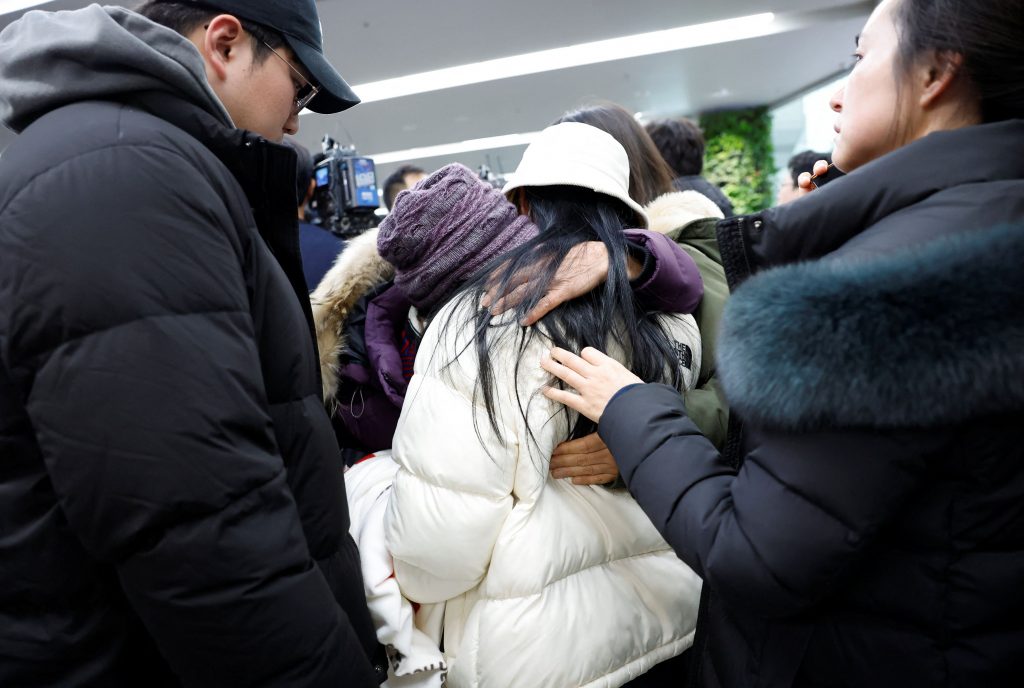
Relatives of a passenger of the aircraft that crashed after it went off the runway, react at Muan International Airport, in Muan, South Korea, December 29, 2024. REUTERS/Kim Soo-hyeon
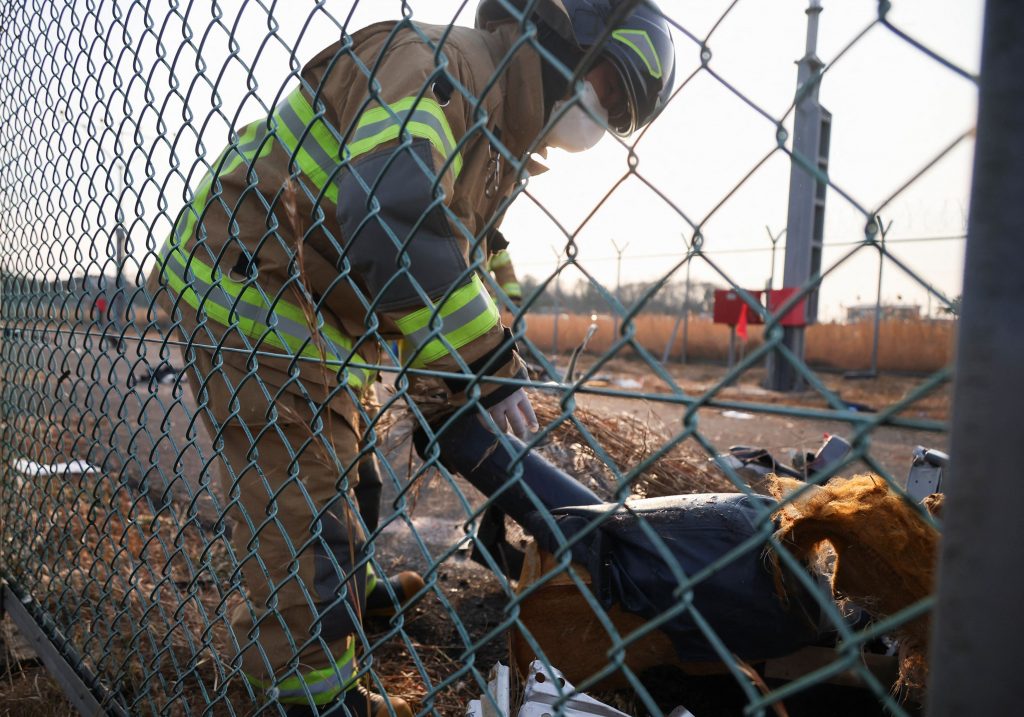
A rescue worker checks the wreckage of an aircraft lying on the ground after it went off the runway and crashed at Muan International Airport, in Muan, South Korea, December 29, 2024. REUTERS/Kim Hong-Ji
South Korea’s police imposed the highest level of the nation’s emergency-alert system, allowing all available police forces to be deployed if necessary. South Korea’s Defense Ministry said it had deployed medical and rescue personnel, including special forces, to provide on-site assistance.
On-site investigators were still determining the cause of the crash.
The Jeju Air plane’s body, according to video footage aired on South Korean TV networks, appeared to skid across the runway at Muan International Airport without the apparent deployment of its landing gear or flaps, which are movable surfaces on the wings that would allow the jet to slow during a typical landing. The aircraft burst into flames upon impact with a concrete barrier.
The Boeing 737-800 is one of the safest airplanes ever built, and an inability to lower the landing gear would be rare and have backstops, such as procedures or checklists to follow if there had been a deployment failure, said Jeff Guzzetti, a former senior accident investigator with the National Transportation Safety Board and the Federal Aviation Administration. Guzzetti, who is now an aviation-safety consultant, said he was puzzled by the crash.
Among the safeguards on the Boeing 737-800 is a system that would allow the pilots to let gravity lower the landing gear if other systems failed, said Guzzetti, who isn’t involved in the accident investigation. He said he wondered whether the crew mistakenly tried to land without the plane’s landing gear down, realized the mistake and attempted a “go-around” to redo the landing. That could explain why the plane was traveling so fast and so far down the runway, he said.
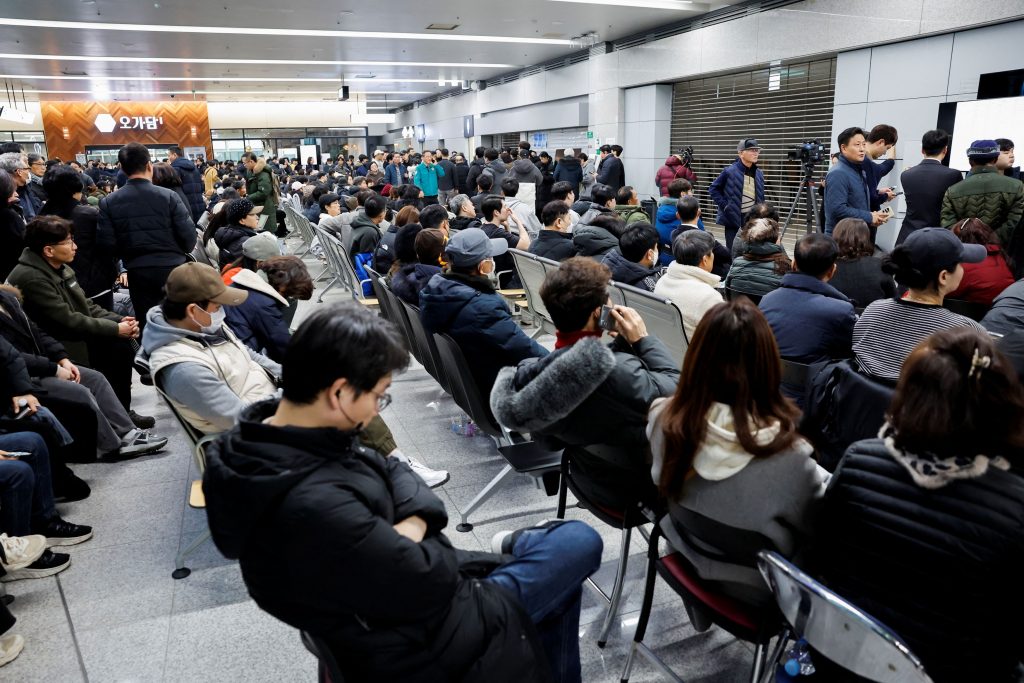
Relatives of passengers of the aircraft that crashed after it went off the runway, gather at Muan International Airport, in Muan, South Korea, December 29, 2024. REUTERS/Kim Soo-hyeon
“If there was a failure there, why not continue to fly, burn off fuel so you don’t have a lot of fuel on board?” Guzzetti said. “You call emergency rescue crews to be ready for you. I don’t see any of that there.”
Boeing said it was in contact with and stands ready to support Jeju Air. “We extend our deepest condolences to the families who lost loved ones, and our thoughts remain with the passengers and crew,” Boeing said.
The plane is severely damaged, with only the aircraft’s tail left relatively intact, a spokesman for Muan County’s fire agency said at a press briefing. Verifying the identities of the victims was difficult because of the fire damage.
About 80 bodies were moved to a temporary morgue and were awaiting family members for identification, the Muan County public health center’s director said during a briefing. Two flight attendants were rescued and transferred to hospitals in the region, the director said.
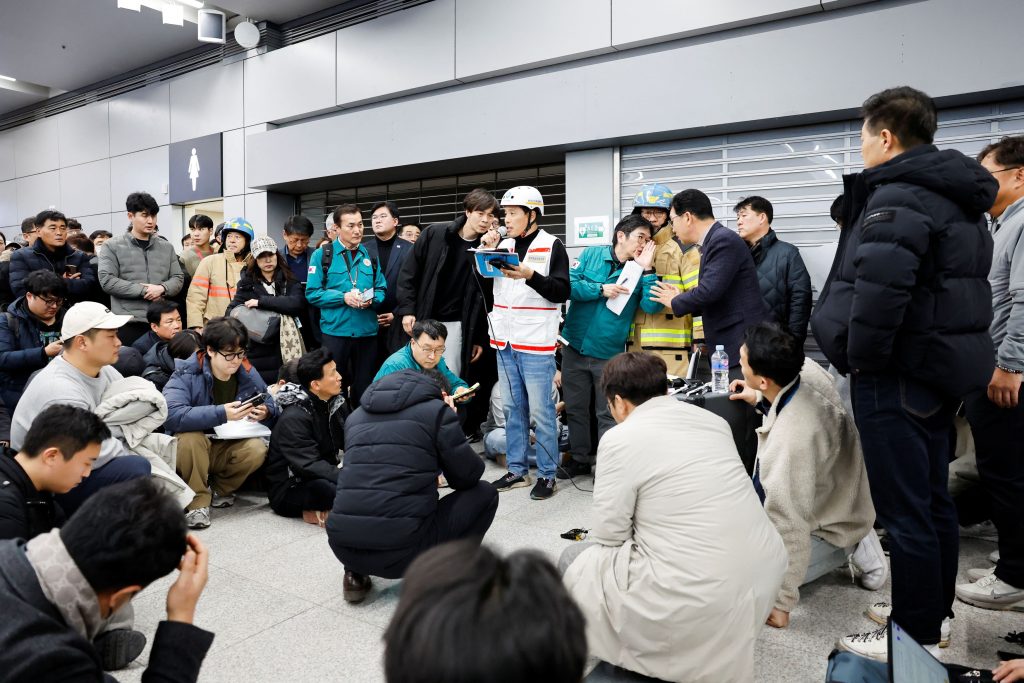
People listen as an official discloses the additional names of passengers who died in an aircraft crash at Muan International Airport, in Muan, South Korea, December 29, 2024. REUTERS/Kim Soo-hyeon
One of the surviving flight attendants, who had been seated at the rear of the Jeju Air plane, sustained a fractured left shoulder and injuries to the head, though was conscious and able to walk, according to South Korea’s semiofficial Yonhap News Agency, citing local hospital officials.
“What happened?” the 33-year-old flight attendant told a doctor, Yonhap reported. The flight attendant recalled wearing a seat belt and the plane’s landing, though had no memory afterward.
Jeju Air, named after a popular South Korean resort island, is a budget carrier that was founded in 2005. It operates roughly 40 aircraft to more than 40 destinations, and handled more than 12 million passengers in 2023, according to the company’s website.
Shares of Jeju Air have fallen about 30% this year, in the midst of growing competition between budget carriers to lower their fares. A weakened South Korean currency, the won, has caused costs to increase because fuel is generally purchased with U.S. dollars.
The seemingly abrupt belly landing of the Jeju Air plane on Sunday was unusual because the pilots would have had other options, even if there had been a pressing problem due to mechanical troubles or a fire onboard, said Hiroshi Sugie, a former Japan Airlines pilot who has written books about aviation safety.
“A belly landing isn’t something you rush into doing,” Sugie said.
At the Muan airport, dozens of family members crowded into a conference room and the terminal’s waiting areas where they got a briefing from the local fire department and waited for further updates. Some dropped to the floor in tears.
At least one passenger had been texting with a family member in the minutes before the crash, according to local media, which took a photo of a phone that showed the exchange.
“Should I write a will?” one of the messages reads.
The crash comes during a period of political tumult in South Korea. Earlier this month, President Yoon Suk Yeol made a short-lived declaration of martial law—a controversial move that led to the country’s legislature impeaching him more than two weeks ago. Then, on Friday , Yoon’s replacement as acting president, Prime Minister Han Duck-soo, was also impeached, after declining to make certain judicial appointments.
That thrust Choi, a deputy prime minister, into the nation’s top job. The Muan crash occurred within 48 hours of Choi becoming acting president.
Choi, who had also served as minister of economy and finance, met with victims’ families at the airport on a frigid Sunday afternoon. “I believe no words of consolation will be enough for the families who have suffered such a tragedy,” Choi said.
Write to Dasl Yoon at dasl.yoon@wsj.com , Timothy W. Martin at Timothy.Martin@wsj.com and Andrew Tangel at andrew.tangel@wsj.com
